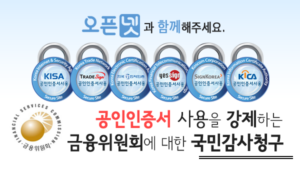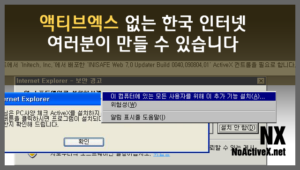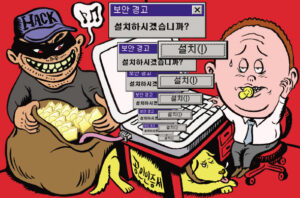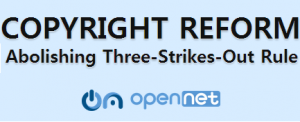Press Release
Petition for “Documentary director Jung Yoon-seok Not Guilty of Documenting the Western District Court Riots” was Submiited by 169 Organizations and 11,831 Citizens
Director Jung Yoon-seok was charged by prosecutors after entering the Western District Court to...
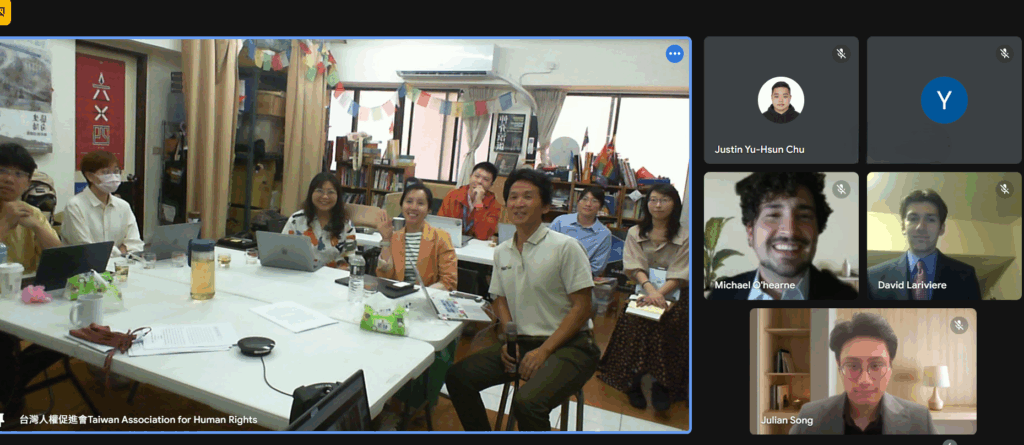
Protected: Open Net and TAHR hold expert consultation on impact litigation on targeted advertising
Password Protected
To view this protected post, enter the password below:
[Joint Statement] Condemns the KCSC for which censors sitire contents that cause social disruption
On February 18, the KCSC held an emergency review and blocked two satirical videos mocking...
Seoul Administrative Court Affirms PIPC’s sanction on Meta for third party targeted advertising for lack of effective consent; Meta has yet to mend
The Seoul Administrative Court decided on January 23, 2025 (Case No. 2023Gu-Hap54259) to affirm...
![[Press Release] German Broadcasters ARD and ZDF Should Apologize to Korea and the Korean People “The Whole World Is Watching”](https://www.opennetkorea.org/wp-content/uploads/et_temp/독일-공영방송은-사과하라-1024x1024-1-242571_1024x675.jpg)
[Press Release] German Broadcasters ARD and ZDF Should Apologize to Korea and the Korean People “The Whole World Is Watching”
March 6, 2025by the Network for Freedom of Expression Against Hatred and Censorship (abbreviated...
LITIGATION
EFF Supports Open Net’s legal challenge against mandatory upload filter
Electronic Frontier Foundation is filing the attached amicus brief in a constitutional challenge...
[Statement] The Industry Protection Act Task Force Expresses disappointment with the Court’s Decision to Dismiss the Constitutional Complaint on the Industry Protection Act: the Task Force will Try to Recover the Right to Know which is Insulted by the Industry Protection Act at Our Best
Seeking unconstitutional litigations for individuals and companies on unfair trial for 'tech...
Court Decision on ‘Bad Fathers’ Case Reveals the Excessiveness and Unconstitutionality of the Truth Defamation: Open Net Urges the National Assembly to Abolish Criminal Truth Defamation Law Immediately
On January 4, 2024, the Supreme Court, Division 2 (Chief Justice Chun Dae-yup, presiding),...

UC IRVINE INT’L JUSTICE CLINIC & KU INT’L HUMAN RTS CLINIC ON WOMEN ON WEB
Women on Web, which has been distributing abortion pills to women in each country who want to have...
Expressing Regret over the Constitutional Court’s Decision to Remove the Right to Access Pseudonymous Information
Before we upload the English version text, please read the Korean version text with translation...
OPEN SEMINAR
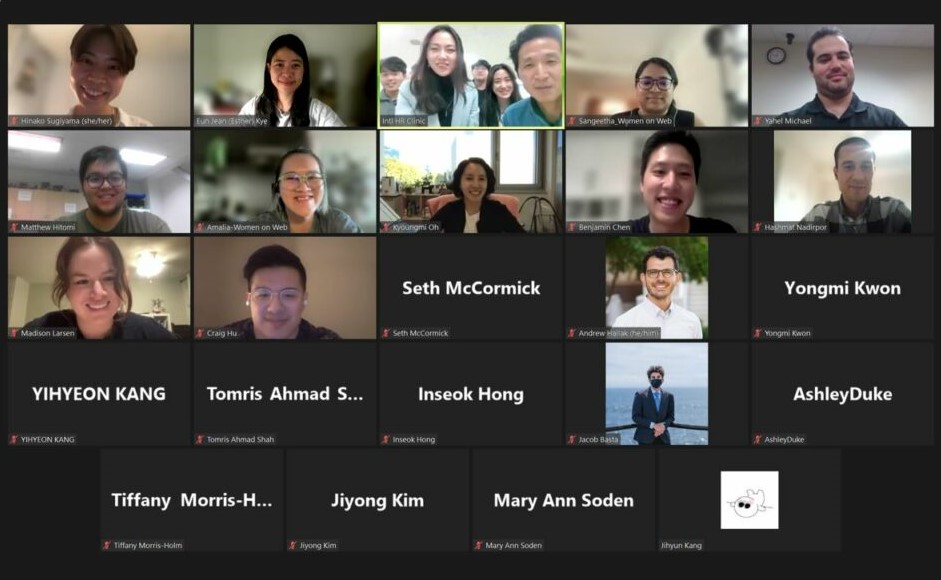
Open Net Co-host Webinar on the Appeal against the Website Blocking of Women On Web by KCSC
On 9 November 2023, the Korea University Law School's International Human Rights Clinic (hereafter...
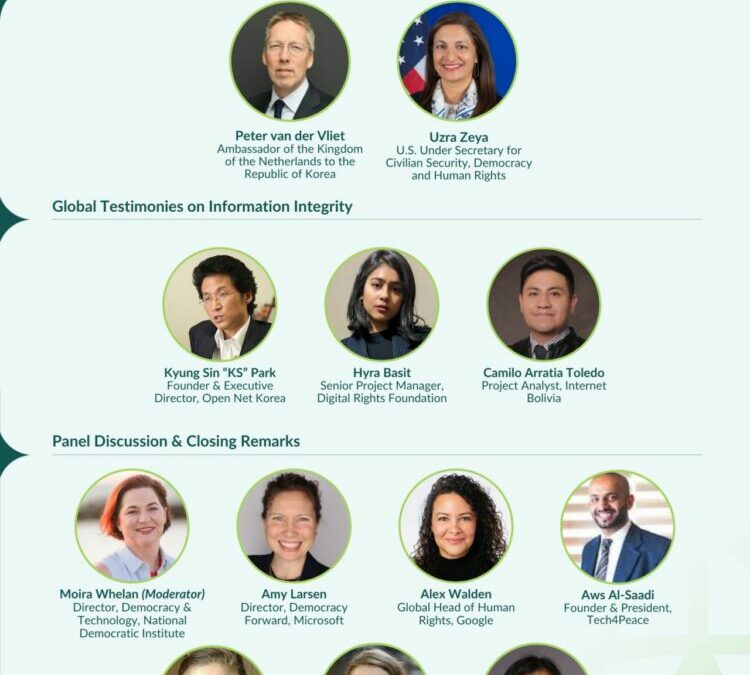
Summit for Democracy Seoul: Freedom Online Coalition workshop on information integrity
On March 19, 2024, Open Net's Executive Director K.S. Park spoke at a Freedom Online Coalition...
Civil Society Condemn Police Threatening Search and Seizure for Presidential Satire!
Tuesday, February 27, 2024, 11:00 AM | In front of Seoul Metropolitan Police Agency (Gyeongbokgung...
[Press Release] Ryu Hee-rim must be the subject of an investigation, not the whistle-blowing employees of the KCSC
Today, we stand in front of the Seoul Metropolitan Police Agency, which conducted a search and...
[Press Conference]Public Announcement for Font File Copyright Royalty Negotiation Guidelines
Before uploading the English version, please read the Korean version with translation tools.
COURT ACTIONS
Open Net Won the Trial Against KT for Disclosure of Subscriber’s Personal Information
Please read the Korean original here.
Open Net Won the Personal Information Disclosure Lawsuit against KT
Open Net General Counsel Kelly Kim won the lawsuit for the disclosure of her personal information...
Open Net Successfully Defended the Police Defamation Victim HONG Ga-hye at the Supreme Court
Open Net provided legal support to Ga-hye Hong, who was accused of "defamation of the maritime...
Open Net Filed a Constitutional Challenge against the Mandatory Mobile Phone Registration Law
Please read the Korean original here.
Court of appeals confirmed that the blocking of “North Korea Tech” website is unlawful
Court of appeals confirmed that the blocking of “North Korea Tech” website is unlawful The right...
education
2019 Financial Statements
2019 Financial StatementsDownload
2020 Financial Statements
2020 Financial StatementsDownload
2021 Financial Statements
2021 Financial StatementsDownload
2022 Financial Statements
2022 Financial StatementsDownload
2023 Financial Statements
2023 Financial StatementsDownload
POLICY RESEARCH

Part 1 of Open Net’s Special Lecture Series on Media Literacy (14:00 April 5, online)
You can read the Korean original here.
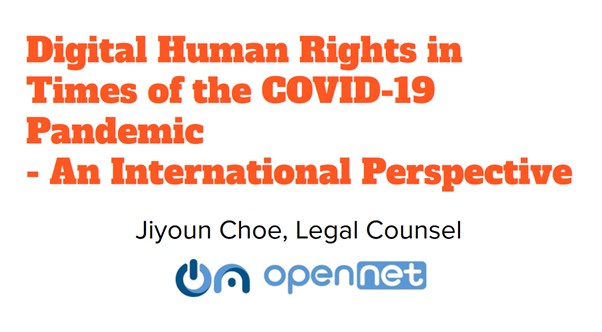
Digital Human Rights in Times of the COVID-19 Pandemic – An International Perspective (TWIGF 2021)
The following is Jiyoun Choe’s presentation at the TWIGF 2021 as part of a panel in the ‘Digital...
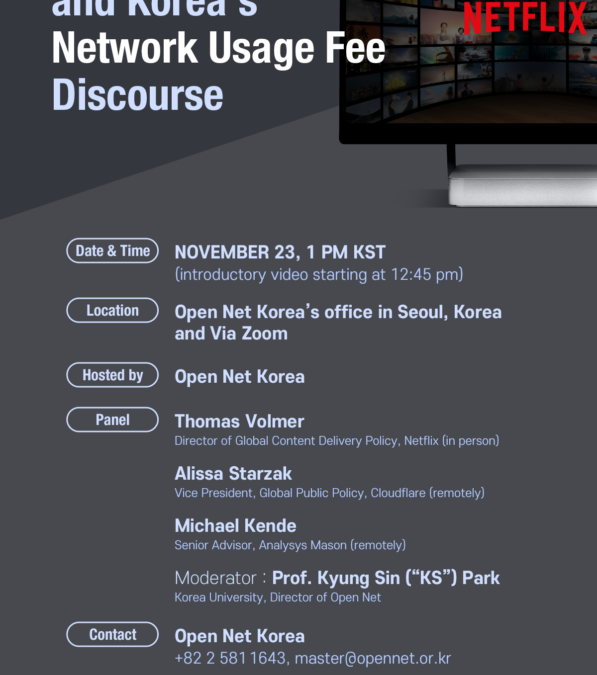
Webinar: Global Internet Interconnection Practices and Korea’s “Network Usage Fee” Discourse
The success of Squid Game and Netflix have raised the cries of “free-riding on internet” against...
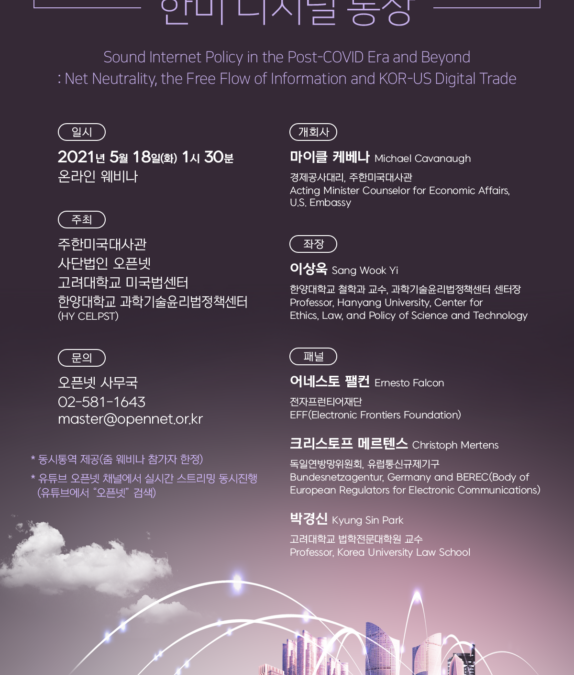
Sound Internet Policy in the Post-COVID Era and Beyond: Net Neutrality, the Free Flow of Information and KOR-US Digital Trade
Sound Internet Policy in the Post-COVID Era and Beyond: Net Neutrality, the Free Flow of...
[Presentations] “AI, Ethics & Data Governance” 20/1/2020
Date & Time: January 20, 2020 (Mon) 10:30-16:30 Location: Veritas Hall, B1F CJ Law Hall, Korea...
CAMPAIGN
Stop Internet Censoring
We have seen many attempts to censor the Internet under the pretext of copyright protection. Notorious attempts are SOPA and PIPA of 2012, which triggered the largest online protest in history and was eventually withdrawn, and ACTA, a plurilateral trade deal killed by the European Parliament in 2012. Now, Korean government tries to enact a much stronger internet censoring rule. If it passes the legislative body, a copyright protection agency may cut off access to websites that the agency views as copyright infringing. The concerns over mass surveillance and privacy vulnerabilities by the proposed rule are widespread amid the government’s new drive to block “https” traffic by SNI eavesdropping (See, press release of Korea Communication Commission on February 12, 2019 and press release of MCST on May 2, 2018, both in Korean).
Intermediary Liability Campaign
Korean law (Copyright Act Article 103, Information Communication Network Act Article 44-2) requires intermediaries to take down all content for which anyone sends a takedown notice, regardless whether the content violates any right or law, not as a condition of qualifying for a safe harbor but as a positive obligation. As a result of this ‘mandatory’ notice-and-takedown system, the intermediaries are forced to take down thousands of contents daily which they believe to be perfectly lawful. Also, Korean laws require some intermediaries like P2P and cyberlockers to implement ‘technical measures’ to filter out copyright infringing material (Copyright Act, Article 104) and obscenity (Telecommunications Business Act Article 22-3 Paragraph 1), and requires all intermediaries to implement technical measures to filter out child pornography (Children and Juvenile Sex Protection Act Article 17). These ‘technical measures’ requirement ends up requiring the intermediaries to monitor each and every third party content posted on their services, turning the Internet into a space open to only those contents implicitly permitted by the intermediaries.
Open Net Korea has engaged in various efforts to bring the Korean law into compliance with the international norm, including but not limited to participating in the Steering Committee of the Manila Principles for Intermediary Liability, co-authoring a Good Practice Guideline for Intermediary Liability Regime published by the Network of Centers for Internet and Society, and calling the international community to write to the relevant officials.
Open Payment Campaign
Currently, the law requires all online payments above 300K Korean won (about US$300) to be signed by so-called “accredited certificates”, which are backed only by a Korean government agency operating as a root CA but none of the internationally recognized certificate accreditation agencies and therefore require various plugins to be downloaded from various vendors (most often through Active X technology due to the 90% plus dominance of Internet Explorer in the country) enabling and protecting the certificates. Such monolithic “closed” payment rule made the Korea-based e-commerce inaccessible for overseas customers and very inconvenient for domestic customers and indoctrinated Korean customers into a dangerous habit of accepting downloads of unknown origins, who therefore became easy targets for pfishing and other financial frauds. Open Net calls for the dismantling of the payment rule mandating use of the government-backed-certificates that are not really “accredited” in any global sense.
In 2013, Open Net ran a petition drive to file a Citizens’ Audit on the Korean Financial Services Commission responsible for implementing the closed payment rule, and obtained the sponsorship of more than 300 signatories who signed on-line at this site.
In 2013, Open Net ran a grassroots petition drive here to demand that the authorities overhaul the online payment rule so that the Korean net users can make payments without the nail-biting, computer-freezing, caution-numbing downloading of all the plugins. Several thousands have signed on putting pressure on the legislators and authorities.
In the latter half of 2013, Open Net lobbied for a Digital Signature Act amendment bill allowing digital signatures to be approved by internationally recognized root authorities and a Electronic Financial Transactions Act amendment bill requiring the Financial Services Commission rule-making to be technology-neutral in accordance with the Basel Principles. Here is the campaign headquarter page from which people will gather information and write mails, Twits, FB entries alerting the relevant lawmakers.
“Real” Child Abuse Prevention Campaign
The law punishes virtual images of imaginary children such as in animation and adult-actor films under the same legal scheme as child pornography made of video-recording or “morphing” of real children, which carry mandatory minimum sentence of 5 years for production and, among other things, 10 years of employment ban and 20 years of residential address tracking, not to mention the stigma of “child sex offenders”. Such law resulted in police actions focused on online uploading and downloading of files at the expense of depleted resources for pornography involving real children, which ironically ended up indictment of juvenile computer users as “child sex offenders”. Open Net calls for amendment of the Child and Juvenile Sexual Abuse Prevention Act to make the law serve its real purpose.
Campaign to Strike Out the Three Strikes Rule
In Korea, the copyright Three-Strikes-Out Rule came into effect on July 23, 2009 and gave the government a power to disconnect users from the Internet in the name of copyright protection. So far, although no one has been disconnected from the Internet, 408 website accounts have been shut down and 468,446 warnings or takedowns have been executed by the South Korean government (The Ministry of Culture and the Korean Copyright Commission, an entity empowered to do so without judicial scrutiny under the three-strikes rule). There is no prior judical scrutiny. The government has the full discretion in determining whether the postings or the user accounts are to be taken down or not. This is administrative censorship done fast and cheap for the rightholders, however, suppressing freedom of expression and communication and Internet users’ fundamental right to access, and endangering the future of the free and open Internet.

